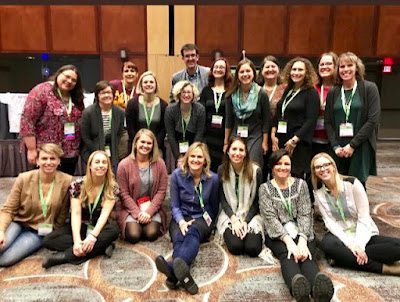Welcoming All Readers to the Table
I, too sing America.
I am the darker brother.
They send me to eat in the kitchen
When company comes,
But I laugh,
And eat well,
And grow strong.
- from I, Too by Langston Hughes
It's two days until Thanksgiving. Students in my classes are beyond ready to go, off to families; off to meals of golden turkey, mashed potatoes with pools of yellow butter, and smooth, cinnamon-sprinkled pumpkin pie; off to sleep in. As I think about my own family traditions at Thanksgiving, it's the table that comes to mind first. The good china, dusted off and laid carefully on quilted place mats. Candles flickering and casting golden light around the room. And the people, everyone I love gathering close.
The table in my family is a place of belonging, a place where everyone has a voice in the conversation, where everyone is valued because they are there.
Langston Hughes' poem is a strong reminder that this is not always the case. In so many ways in our country today, people, because of their skin color, their gender, their sexual orientation, are not invited to the table. Because of power. Because of prejudices. Because of fear. "They send me to eat in the kitchen," he writes. Not wanted. Shut away. Not allowed a voice.
In our classrooms, teachers are the gatekeepers at the table. We have the power to define who belongs and who is excluded. One way we do this is with the books we choose. We can fill the shelves in our rooms with titles representing various ethnicities, genders, religions, and cultures. We can choose books that allow our students to see themselves and to see others in the characters between their pages. We can help build individual identities by naming them, and we can help students see and understand those whose lives are vastly different from their own. We can.
Or, we can, not. We can stick to the cannon, the traditionally white, historically male, authors who have been called classics in our culture. We can limit kids' book choices to those books we've labeled appropriate, literary, rigorous. We can assign students books by level, by skill, or by the five-finger rule.
 This weekend at NCTE in St. Louis, I had the pleasure of meeting many authors that my students adore. I heard Jason Reynolds telling the story that inspired his newest book, Long Way Down. I met Angie Thomas, author of The Hate You Give, and passed along notes from my black girls, thanking her for writing a book with a character that sounds like them. And, I talked with Nic Stone, whose book Dear Martin, is starting real conversations about stereotypes, racism, and the pain of ignorant assumptions in my classroom.
This weekend at NCTE in St. Louis, I had the pleasure of meeting many authors that my students adore. I heard Jason Reynolds telling the story that inspired his newest book, Long Way Down. I met Angie Thomas, author of The Hate You Give, and passed along notes from my black girls, thanking her for writing a book with a character that sounds like them. And, I talked with Nic Stone, whose book Dear Martin, is starting real conversations about stereotypes, racism, and the pain of ignorant assumptions in my classroom.
As much as these books are speaking to me right now, opening my eyes to what it feels like to live in black skin, they're not required reading in my room. I cannot assume that what I need right now is what every one of my students needs too. When I recommended All American Boys to Diondre, he politely but firmly refused. "Don't put me in a box, Ms. Hagen,” he said, “I don't need to read about that police stuff to know it. You got some Greek mythology?"
The table isn't empowering because of my invitation. The table is empowering because of the students' choice to sit down, to join the conversation, to speak their truths with strong, sure voices.
Tomorrow
I'll be at the table
When company comes.
Nobody'll dare
Say to me,
"Eat in the kitchen,"
Then.
Langston Hughes does not say he'll be invited to the table; he says he'll be at the table. It is his choice. I don't give my students voice and choice. They already have voice and choice. I simply choose give them a space to be who they are, to read what they need, to figure out and speak their own truths. That is the best invitation I can offer.
When Diondre declined All American Boys, there was no argument from me. Again, I loved this book, but that doesn't mean all my students have to love it. I value my students’ strong thinking, strong knowing themselves, and strong refusals, far more than I value their agreement with me, their conformity to my wishes, or their exclusion from the table.
This Thanksgiving, as we join families and friends, gathering to give thanks, I hope we’ll take time to really see everyone who’s present at our tables: the tables of our families, the tables of our country, and the tables of our classrooms.
Let’s celebrate how beautiful we all are.
We, too, are America.
Happy Thanksgiving Everyone!




Comments
Post a Comment